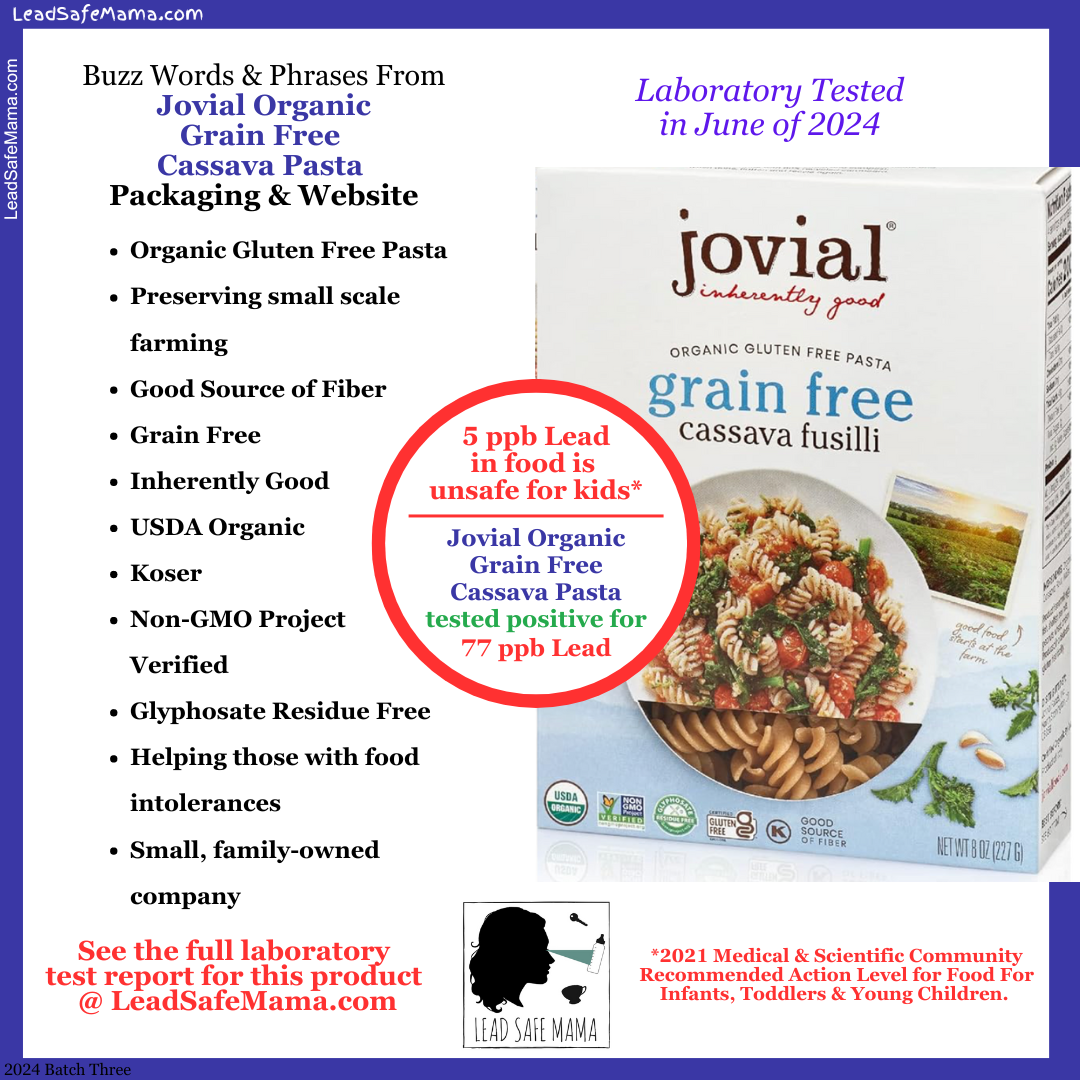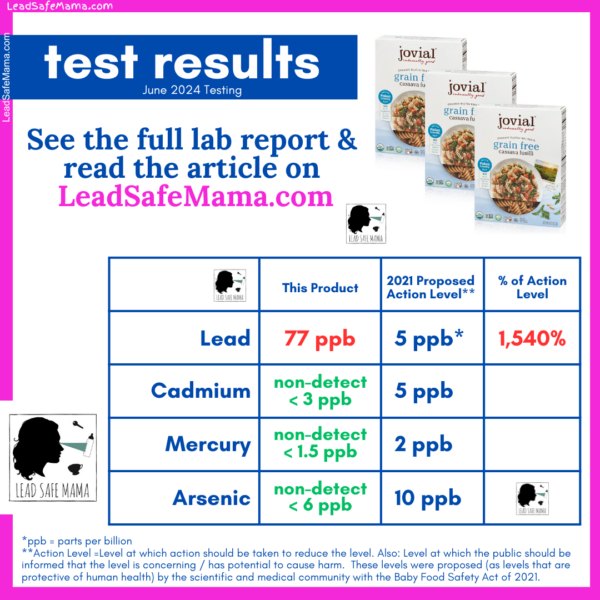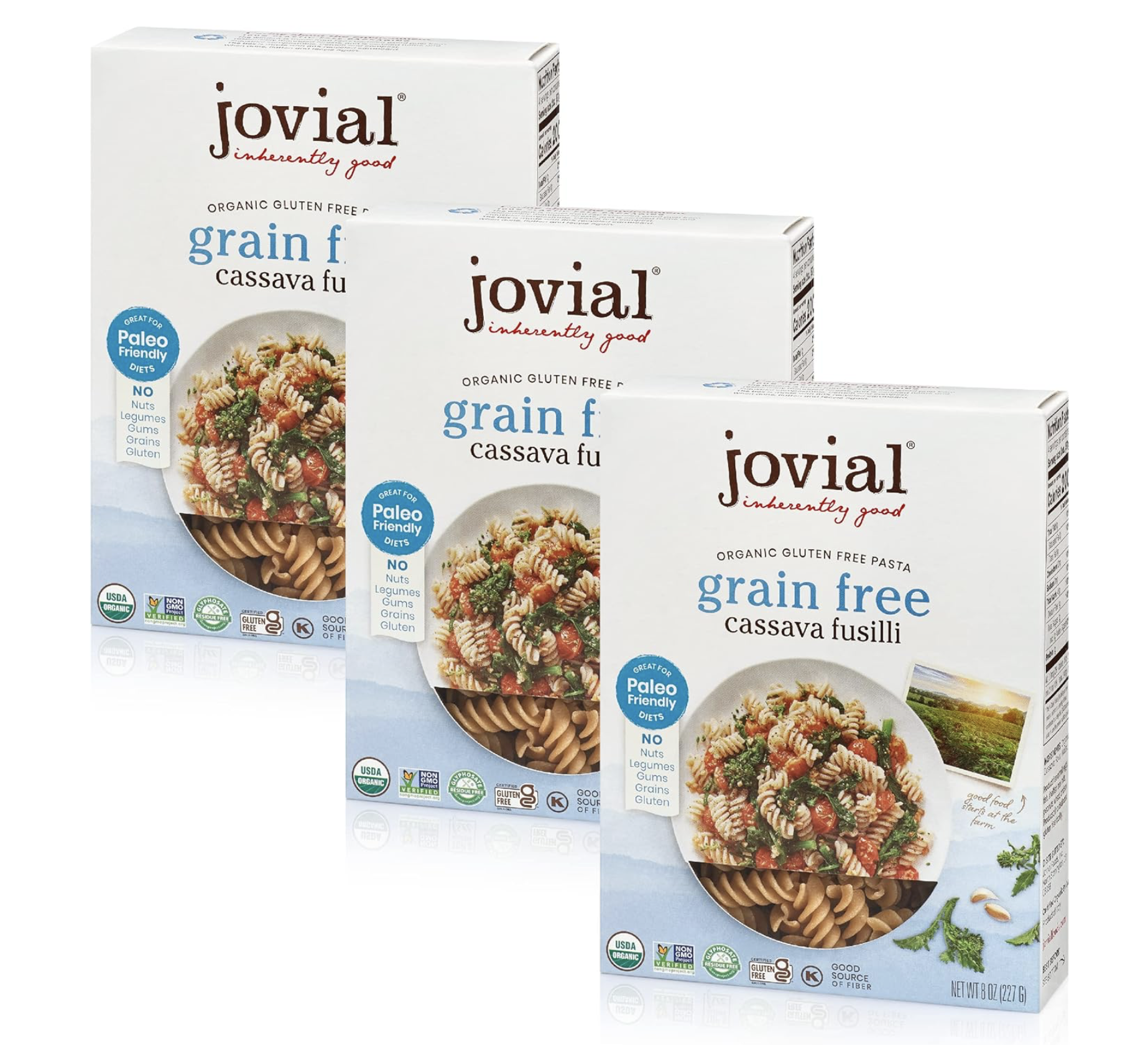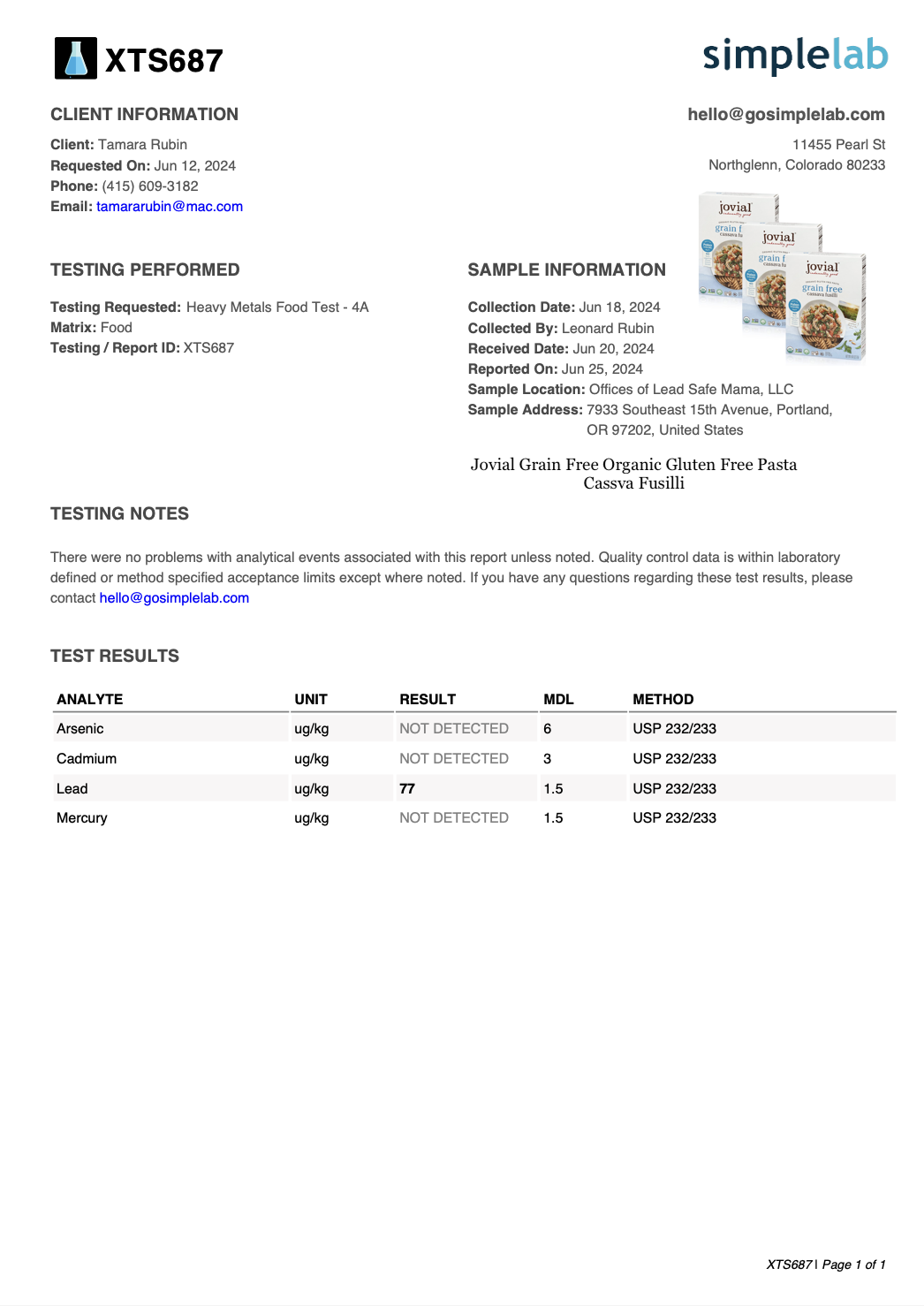Jovial Organic Grain Free Cassava Pasta tests positive for unsafe levels of Lead. Read the laboratory report here.
For those new to the Lead Safe Mama website:
Tamara Rubin is a multiple-federal-award-winning independent advocate for childhood Lead poisoning prevention and consumer goods safety, and a documentary filmmaker. She is also a mother of Lead-poisoned children (two of her four sons were acutely Lead-poisoned in 2005).
- Tamara owns and runs Lead Safe Mama, LLC — a unique community collaborative woman-owned small business for childhood Lead poisoning prevention and consumer goods safety.
- Since July of 2022, the work of Lead Safe Mama, LLC has been responsible for five product recalls (FDA and CPSC).
- All test results reported on this website are science-based, accurate, and replicable.
- Please check out our press page to see some of the amazing coverage of our work so far this year!
Affiliate link to the test kit Lead Safe Mama, LLC uses for the laboratory food test results we publish: https://amzn.to/3UIPcHP
This is an ad-free article.
Advertising and affiliate income help Lead Safe Mama, LLC cover the costs of the work we do here (independent consumer goods testing and childhood Lead poisoning prevention advocacy). We have removed ads from most of our more widely-read articles (and newly published articles, too — like this one!) to make them easier for you to read. In addition to supporting this work by starting any shopping you might be doing with a click on our affiliate links, if you would like to support the independent consumer goods testing and childhood Lead poisoning prevention advocacy work of Lead Safe Mama, LLC by making a contribution (which will also help us keep our more widely-read articles ad-free), click here. Thank you!
Important Background: What is an Action Level?
Please note the following key points.
The original lab report for this product is below (at the bottom of this page).
The graphic above shows the levels of metals detected in this product (in red) along with the low threshold of detection (in green) for each of the metals not detected with the laboratory testing that Lead Safe Mama, LLC had completed for this product. The numbers are juxtaposed to (in blue) the “Action Level” that was proposed by the medical and scientific community in 2021 as part of the Baby Food Safety Act.
- These levels were set as “Action Levels” that are (in fact) protective of human health.
- An “Action Level” is NOT the same as a “Maximum Allowable Level.”
- Once the level of a heavy metal in food reaches the “Action Level,” that metal is officially over the threshold of safe and into the realm of heavy metal levels that can cause lasting harm to children.
- The “Action Level” is the level at which the scientific and medical community believes the company (or government) needs to take ACTION to fix the problem (which also includes taking ACTION to inform the public that the product has an unsafe level of the metal detected at-or-above the “Action Level” — and which relevant batch numbers should be recalled/ not consumed).
- These Action Levels are not arbitrary, however they were not passed into law.
- These Action Levels reflect the current advice of the medical and scientific communities as levels both achievable and also protective of infant and toddler health — regardless of the fact it is not illegal to have food for children test positive at these levels (as the Baby Food Safety Act of 2021 was not passed into law).
- The legitimacy of these levels as “Action Levels”/ “Levels of Concern” (even though they were not adopted as law) is similar to the legitimacy of the America Academy of Pediatrics’ level of concern for Lead in water — which is 1 ppb — even though the FDA’s official “level of concern” for Lead in water is 15 ppb (you can read more about that here).
For safer food choices, click here.
If you are new here, please check out our website menu (link) to see all the other items we have tested and reported on! Welcome to the site!
Published: July 5, 2024
The Jovial Organic Gluten Free Cassava Pasta (pictured in this article) tested positive for a level of Lead that is unsafe for children to consume.
Supporting considerations:
- All federal agencies agree there is no safe level of Lead exposure.
- Lead bioaccumulates over time (it bio-mimics calcium and is stored in the body in place of calcium — especially during periods of significant growth, as seen when younger children go through growth spurts). This is the mechanism by which Lead interrupts nearly all biological functions in one way or another — including brain function.
- Given the proposed “Action Level” (discussed and defined above) of 5 ppb for Lead in food products that may be consumed by young children, the 77 ppb Level of Lead we found via laboratory testing of Jovial’s Organic Cassava Pasta is — by any measure — very high (more than 1,500% of the Action Level).
- Measuring toxicity in parts per billion is not a serving size dependent metric. While some standards for evaluating Lead exposure look at how much Lead one might consume in a serving of a given product, using a standard that is instead based on “parts per billion” levels is a better way to protect human health. This is because most people do not consume only a “single serving size” of any food (especially when serving sizes are set by the manufacturer). Setting a ppb limit (as was proposed with the Baby Food Safety Act of 2021) is the most protective of human health and is also how our federal agencies have set limits for toxicants found in drinking water (in ppb or ppt — parts per trillion, depending on the toxicant).
- Interestingly enough, another product from this brand (the Jovial Einkorn Flour) tested “non-detect” for Lead, Cadmium, Mercury, and Arsenic, presenting more evidence that Cassava-flour is the ingredient of concern in many of the flour-based products we have tested. You can read our article about the Jovial Einkorn flour here (here’s a link to that product on Amazon as well: https://amzn.to/4bsaL5P).
Takeaway
If you have been feeding this product to your young children (or consuming it yourself), and especially if your family has been eating this product on a regular basis (once-a-week or more often), it would be prudent to stop using the product immediately and consider getting a Blood Lead Level (BLL) test (to help determine if there has been any exposure of concern from consuming this product).
- We recommend talking to your doctor as a first step.
- You can learn more about Blood Lead Level (BLL) testing at this link, and this link.
- In our experience, Lead exposure from regularly consumed contaminated food sources (when there are no other likely or suspected sources of Lead exposure) tends to result in blood Lead levels in the range of 1.5 to 4.0 micrograms of Lead per deciliter of blood.
- The average BLL of children today falls within the range of 0.5 to 0.6 micrograms of Lead per deciliter of blood and we advise families that a BLL of 1.0 or higher is indicative of a specific source of exposure (vs. normal anticipated background blood lead levels for most children today).
- A study published in 2012 (linked here) found that the average BLL of a woman of childbearing age (at that time) was in the range of 0.43 micrograms of Lead per deciliter of blood. This average BLL has decreased in the decade plus since then, so we also recommend that if an adult tests positive for Lead with a BLL of 1.0 or higher, it should be a considered a concerning level and any possible efforts should be made to remove the suspected sources of Lead exposure — especially suspected sources of Lead in the diet (you can read more about that here).
- Given all of the above considerations, it is important to find a lab or clinic that tests for a very low threshold of detection (for Lead) — a level that might be lower than testing that your doctor’s office/ pediatrician’s office normally offers (many BLL tests have a low threshold of detection of 3.0 or 3.3, for example). We recommend you find out what your clinic’s low threshold of detection is prior to getting tested (as you may need to get a referral to a lab with more accurate blood testing equipment/ lower possible levels of detection for heavy metals). This is discussed in detail in the links from item #2, above.
Some additional reading & links that may be of interest:
- A link with a spreadsheet showing all of our food testing currently in progress (since June 2024).
- The Lead Safe Mama affiliate link to purchase the test kits we used for this testing.
- Our landing page with links to all the results for the food products we have tested.
- Here’s how to send your own food samples into a lab for testing (the cost is $195 per single food sample tested for Lead, Cadmium, Mercury, and Arsenic) or how to collaborate with Lead Safe Mama, LLC on the food testing we’re hosting.
- The Food category of articles here on Lead Safe Mama dot com.
Amazon links are affiliate links. If you purchase something after clicking a Lead Safe Mama, LLC Amazon affiliate link, we may receive a percentage of what you spend at no extra cost to you.
Never Miss an Important Article Again!
Join our Email List










Do you have recommendations for another pasta company that is safe??? Thank you!
Hello! Thank you for commenting! This is AJ (one of Tamara’s sons). I’m helping my mom answer questions.
Check out this article for more information on safe food products/brands:
https://tamararubin.com/2017/03/which-foods-have-lower-lead-levels-tamaras-food-list-including-foods-we-try-to-avoid-at-all-cost/
This is an excerpt from that article regarding pasta:
“Organic pasta: Tinkyada’ Pasta, Joy Brown Rice pastas, and Lotus Foods’ Organic Jade Pearl Rice Ramen are favorites! ”
Here’s another great article with a list of recommended snacks:
https://tamararubin.com/2024/06/are-you-suffering-from-snack-paralysis-are-you-concerned-that-all-snacks-test-positive-for-lead-here-are-some-safer-snack-ideas-for-your-kids/
Please consider subscribing to the free mailing list by clicking the blue “subscribe” button at the top of this article to stay updated on any new information in real time!
Thanks!
I’m curious what you would guess is the safety level of Jovial’s Brown Rice pasta that only uses brown rice and no cassava. I realize you haven’t tested it, but I’m curious because my toddler and I eat it often. I was hopeful for Jovial foods after their einkorn flour tested so great. It’s too bad.
i expect it will test positive for high levels of Arsenic.